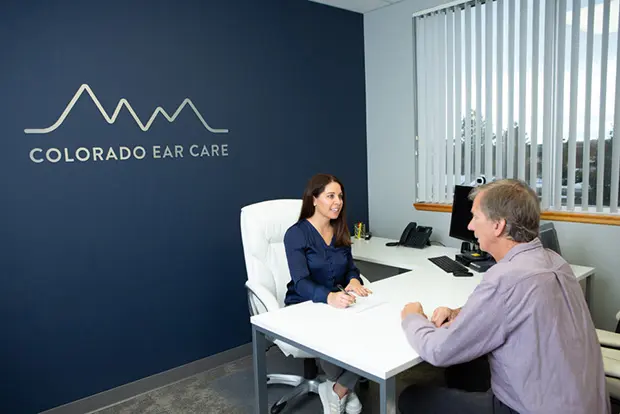Can hearing aids help with my tinnitus?
If you’re among the 25 million Americans who have experienced tinnitus in the past year, you know that its effects can be extreme.
For some people, tinnitus can be so distracting that it becomes disruptive to live a normal life. Unfortunately, there is no cure for tinnitus, but luckily there are treatments available that can help people learn to live with tinnitus while living an active and far less stressful life.
One treatment that might surprise you? Hearing aids. Though tinnitus can be caused by a number of factors, one of the most common reasons that people experience tinnitus is due to exposure to loud noise.
Of course, another result of noise exposure is hearing loss, making the relationship between tinnitus and sensorineural hearing loss deeply interconnected.
Thanks to the many advancements in digital hearing aid technology over the past several years, people who have both hearing loss and tinnitus now have a unified way to treat these conditions.
Before moving on, we should note, you don’t have to have hearing loss in order to benefit from this type of hearing aid. They can also be used to treat tinnitus on its own.
How do hearing aids treat tinnitus?
If you’re someone who would benefit from wearing hearing aids for the treatment of hearing loss and tinnitus, then there are specific types of hearing aids that are designed to address both circumstances.
How? Well, on the hearing side of things, your audiologist will take your test results and use them to program your hearing aids so that you can hear more of the frequencies you’re missing at the volume you’ve previously been unable to hear them.
Your provider is tailoring your hearing devices to your unique hearing needs, doing so carefully to help you rediscover the sounds you’ve been lacking while protecting the hearing you still have.
It’s much more than simply turning up the volume on a device, which would ultimately damage your hearing, further degrading your hearing health.
Now, in terms of how hearing aids can also treat the effects of tinnitus, an entirely different approach must be taken.
Typically, hearing aids that are designed to treat tinnitus feature software that produces sounds called maskers.
These maskers essentially produce white noise, which are a mix of sounds spread across an array of frequencies that, when programmed appropriately, can cancel out distracting sounds like the ones people hear when they have tinnitus.
When this technology is configured by an expert who has an intimate knowledge of hearing and patient care, the devices are able to highlight the sounds people want to hear while concealing those that they don’t.
What are other causes of tinnitus?
Though noise-induced hearing loss is perhaps among the most common reasons people experience tinnitus, there are a number of contributors as to why a person might be perceiving the buzzing, pulsing, or ringing sounds ordinarily associated with this condition. They include:
- Injuries to the head and neck
- Ear infections
- Blockage caused fluid, earwax, dirt, etc.
- Ototoxic medications
- Temporomandibular joint disorder
- Meniere’s disease
- Circulatory issues
- High blood pressure
- Diabetes
- Tumors in the head and/or neck
- Thyroid issues
- Muscle spasms
- Migraine headaches
- Lupus
- And more
How can I protect myself and my loved ones from tinnitus?
Speaking specifically to tinnitus resulting from exposure to noise, one of the most important things you can do is to be mindful of the risks of certain environments and activities.
Protecting yourself from them will go a long way in preventing both tinnitus and hearing loss.
For instance, if you have a loud occupation, like construction, manufacturing, farming, musician — even early childhood education! — wearing hearing protection during its noisiest moments will help protect and preserve your hearing.
If you’re someone who loves to attend concerts, sporting events, ride motorcycles or ATVs, hunts or shoots for sport, or is into woodworking, it’s incredibly important that you wear hearing protection while participating in these activities.
You might bristle at the idea of earplugs, but trust us, taking this one simple step will help your hearing health for decades to come.
What are the best ways to protect your hearing?
Well, avoiding noisy environments and situations altogether is probably the best way to protect your hearing, but we know that’s not realistic.
Since quitting your job and your favorite hobbies are out of the question, the next best thing you can do is to wear hearing protection. While wearing the one size fits all foam plugs are better than nothing, the even better option is custom hearing protection.
Custom hearing protection is created by taking a mold of your ear’s anatomy and using that impression to create earplugs that are tailored to their unique shape, creating a plug that is comfortable, effective, and completely personalized.
Tinnitus? Hearing aids? Custom earplugs? Colorado Ear Care does it all.
Our practice specializes in hearing testing, treatment, technology, custom hearing protection, musician earplugs and in-ear monitors, as well as services related to dizziness and balance.
If you’re concerned about tinnitus and the stress it’s causing you or a loved one, then the most important thing you can do is to seek professional help.
Getting the appropriate testing, counseling, recommendations can be the key to a whole new way of life, the one you’ve been waiting for. Contact our practice today for your appointment.

